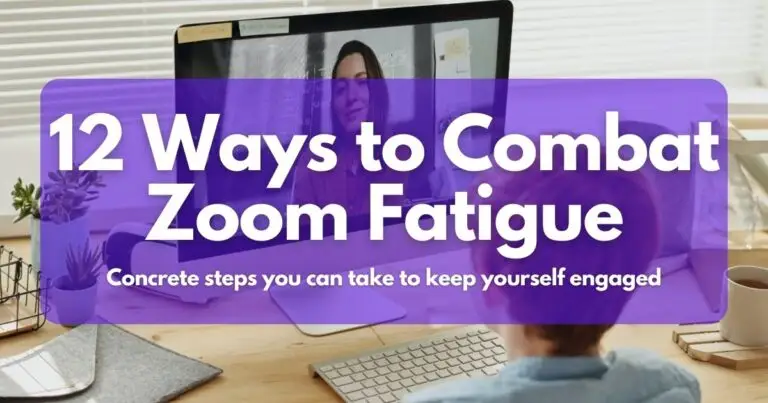New school year, more screen time, more Zoom fatigue.
The school year is starting, and with all of us about to spend a good portion of our day online, that means young eyes on screens for too many hours a day. Let’s have a frank discussion about Zoom fatigue and how to combat it.

There are many contributing factors to Zoom fatigue. Eye strain is the first that comes to mind, and it is a real problem. Even with today’s vastly improved computer monitors and tablet screens, the light coming out of screens is still significantly harder on our eyes than natural light bouncing off of books and paper.
Furthermore, on a video call, the only way to show that we are paying attention is to look at the screen. Continuously. In face to face conversations, our eyes are constantly moving, wandering and changing focal distance as we converse, but we don’t have that luxury online.
Because most of the time we can see a small image of ourselves at all times, we’re even more hyper-aware of what we look like, and that makes us even more likely to be staring at the screen and paying attention to ourselves rather than the teacher or other students.
But even this can add to one of the biggest problems with working online…it is even harder to focus on what people are saying in an online environment. “Zooming out” is a real phenomenon.
Add to that the distractions of being home—and exerting a lot of brain power to create some sense of context that we lose because online we can’t read non-verbal communication (which is a huge part of our in-person interaction)—and what you get is a mentally and emotionally taxing day in front or your computer or tablet.
But don’t despair. There are things you can do to reduce Zoom fatigue and keep yourself on track during these difficult times.
- Be prepared. If you are not ready for your online session, it will only add to the stress as you scurry around—on camera—organizing the things you need.
- Engage as much as possible during Zoom classes. Participating actually reduces some of the strain of screen time.
- Hide your window so you can’t look at yourself.
- Use Speaker View so you aren’t distracted by other students.
- Build in short breaks and get away from your screen. Go for short walks, or at the very least, gaze at the horizon to change your focal distance and stretch out your eye muscles.
- Exercise before or after long online sessions. Even a brief walk can help reset your mind and body.
- Sit up straight in a comfortable desk chair. This takes strain off of your neck and back and actually helps you think more clearly and feel better about yourself.
- Don’t multitask during sessions or you will miss a lot of information.
- Take notes on paper, which forces you to look away from the screen in a productive way.
- Print out any material you can ahead of time and use real paper instead of a screen whenever possible.
- Significantly reduce your unnecessary screen time. Talk on the phone instead of video-chatting with your friends. Eliminate meaningless web time. Reduce video gaming time.
- Put your devices away at least 30 minutes before bed and read a book instead of playing with your phone.
What About Online Tutorials?
We strive to incorporate as many of these techniques into our online tutorials as possible. Because we are continuously engaged one-on-one with our students, the experience is already less fatiguing. We build in short screen-free breaks during long sessions, encourage good computer use habits, encourage the use of paper and pencil, and try to be as efficient as possible so students don’t have to spend too much more time in front of their devices.





